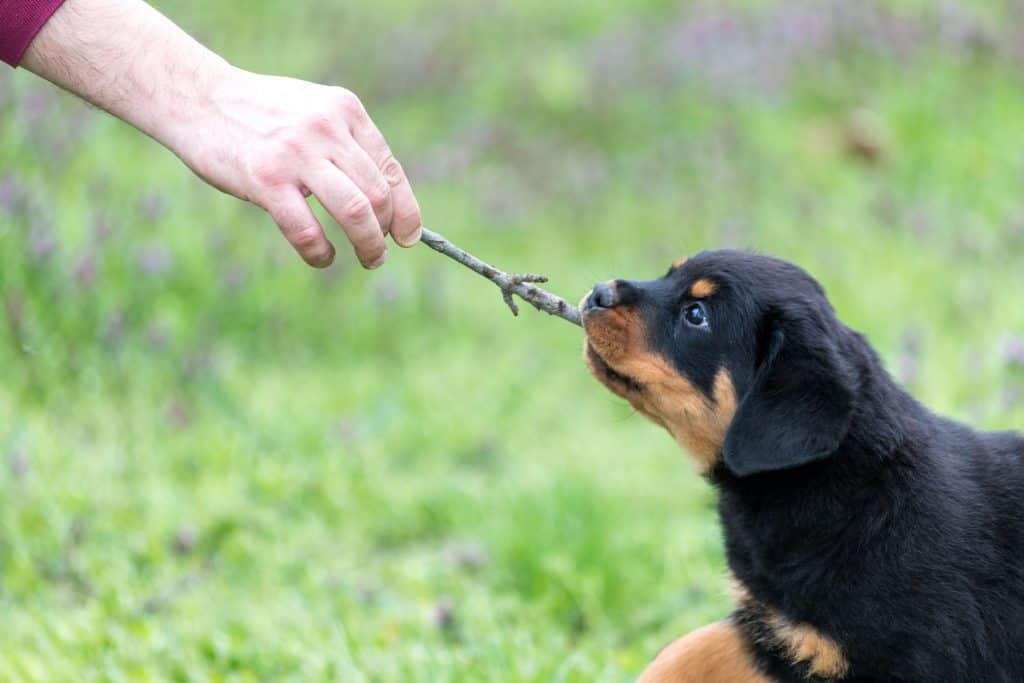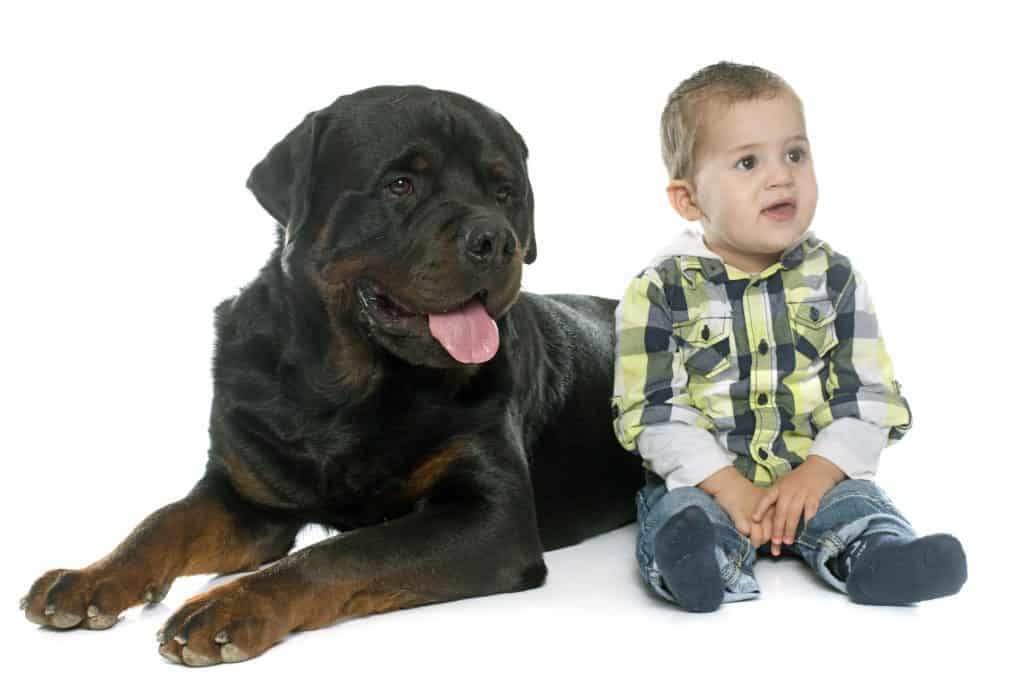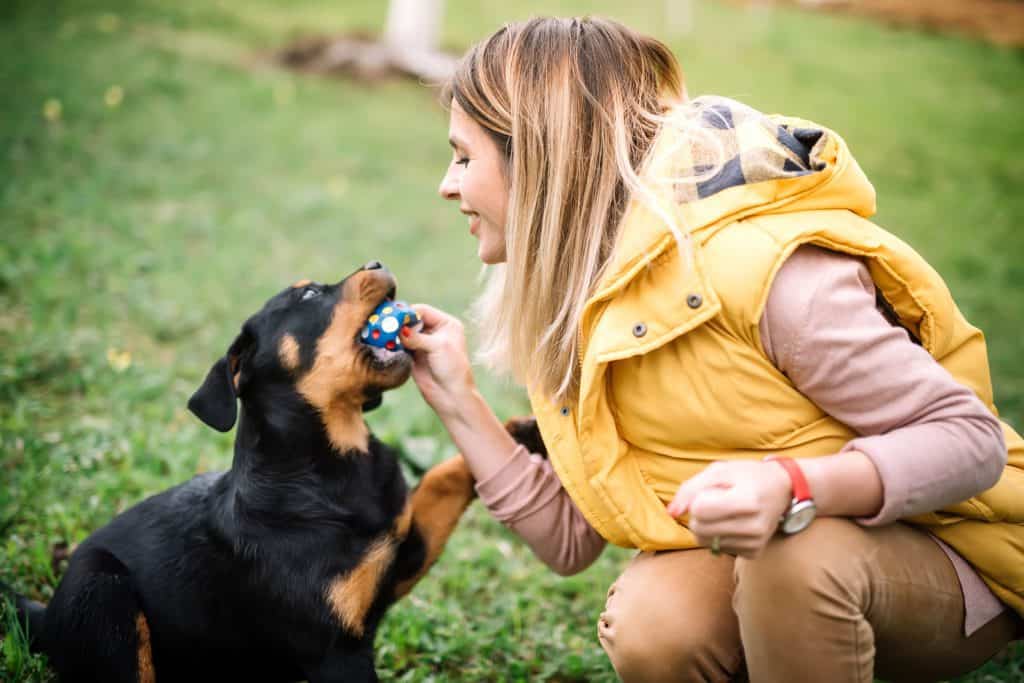Are Rottweilers Good with Kids? A Guide for Parents
There are several myths surrounding the Rottweiler breed, including how aggressive they are and dangerous to children. Would a Rottweiler ever be suitable as a family pet, or would it turn on its owners like people think they do?
Are Rottweilers good with kids?
Rottweilers are no more dangerous to a child than any other dog breed. If they are raised and trained properly, they are very protective, loyal, and loving towards their family. If they are treated with love, a Rottweiler will always be kind and never turn on its family.
Now that we’ve got that out of the way, let’s take some time to really look at how Rottweilers can grow to become these loving and kind breeds for you and your children.
A Rottweiler’s Temperament
The Rottweiler is a robust working breed of great strength descended from the mastiffs of the Roman legions. A gentle playmate and protector within the family circle, the Rottie observes the outside world with a self-assured aloofness.
American Kennel Club, about the Rottweiler.
To your surprise, the Rottweiler is one of the most popular dog breeds in the US, and there are good reasons as to why.
Rottweilers, at their core, are incredibly loving towards their owners. They usually enjoy being in the company of children and other household pets- if you already have a family, are expecting, or have other dogs or pets and want to introduce a Rottweiler into the mix, they will most likely have an easy time intermingling with new friends.
Rottweilers are one of the best breeds to be a guard dog, which shows in their personalities. They are more watchful, so if they are introduced to something knew, they will respond with caution rather than excitement.
Their supposed “aggressive” nature stems from their protective natures.

In their core, they are silly dogs. The American Kennel Club describes Rottweilers as playful and “a gentle playmate.” If you have young children, then they and a Rottweiler can find friends in one another.
Along with being exceptional guard dogs, Rottweilers are also classified among the working breeds. They were originally bred to work in the field and help herd cattle. Today, Rottweilers maintain their confident, assertive, and powerful personalities.
Perhaps the cutest thing about Rottweilers is their unawareness of how big they are. They don’t seem to understand that they are a larger breed, so they may want to cuddle with you on the couch, on the bed, or sit in your lap.
It’s the most adorable thing to see your kids cuddling with your pet, and although they should be very gentle with your children, you should still be cautious that they don’t accidentally hurt or smother them with their canine love.
Raising a Rottweiler with Newborns
As said earlier, Rottweilers will approach new things with caution- this includes children. The best way to ease a Rottweiler- or any dog- into the presence of a new baby is to introduce them before the baby comes. Some suggestions may be to introduce the sounds and smells that are associated with a baby.
A very important part of a Rottweiler’s training is that they are properly socialized with kids when they were a puppy. Learning to be around kids at a young age will carry with them throughout their lives- if a new child comes into the picture, they will understand that they are friendly and reciprocate this attitude.
If you have a Rottweiler that didn’t get very much interaction with children when they were young, there’s still a chance for them! Introducing your Rottweiler and child to each other gradually will help for them to become acquainted with your child.
Before you bring the baby home, bring home a blanket, a hat, or something that has the baby’s scent and allow your dog to smell it.
You should also try and include your dog as much as you possibly can. Any dog will become jealous if they were receiving all the attention in the world, then one day something else came and took it away.
Another very important thing to do is to always supervise any and all interactions between a Rottweiler and a baby. Like I said earlier, Rottweilers don’t understand their size and strength, so it’s important to supervise to make sure the dog doesn’t accidentally hurt your child.
Here is a small guide of behaviors you should make sure your Rottweiler understands when they’re around children:
- Make sure they understand any areas they aren’t allowed in (i.e., the baby’s bedroom or rooms when the baby is laying on the floor).
- Train them not to jump or play with the baby.
- Help them understand there will be times that they will need to be alone for small periods of time (Don’t worry- Rottweilers are capable of being left alone for short periods of time).
Raising a Rottweiler with Toddlers

Some of the same information from the previous section
A great way to bond your children with a Rottweiler is to include your child in taking care of them. If you have a puppy, this is very important, as puppies have a tendency to view kids as other puppies.
Including your child in raising a Rottweiler will help the Rottweiler to recognize your child as an authority figure and that they shouldn’t try and boss them around.
Teaching Your Kids
I have a one-year-old nephew whose instinctive reaction is to lightly tap or hit his hands on our arms, legs, or chests. My family and I don’t mind as it doesn’t hurt (most of the time… unless it’s a day he needs his nails clipped).
However, his parents recognize that other animals won’t find this cute, and they might retaliate if they’re constantly bugged, teased, and pulled on. He’s been taught what “gentle” means, and it’s so cute to see him ever so lightly pet a cat or a dog as soon as he hears the word.
While your child is still young, they will view everything as a toy or as food. On the bright side, your child probably won’t view your dog as a snack and bite them, but if they aren’t taught how to properly care for a dog, your dog might bite them
Here are some important things to teach them:
- Teach your children not to pull on your pet’s tails, ears, or fur.
- Teach them not to hit or grab at your pet.
- Teach them how to pet cats and dogs.
- Teach your children to use an “inside voice” and to not scream or yell, especially if you have a puppy. This will prevent the pup from thinking your child is something they can chase and knock down.
Training a Rottweiler

The most common reason for a Rottweiler to grow up to be aggressive and mean is through an aggressive and mean upbringing brought on by their owners; any dog can grow up to be a vicious dog depending on their masters.
Training is a very important factor in guaranteeing your Rottweiler will grow up as what they are meant to be- loving, loyal, and obedient.
Like I said before, Rottweilers are working breeds. They have been bred to become police dogs, cattle herders, and for the armed forces. This means they are very intelligent and willing to learn. Young Rottweilers are relatively easy to train, and if they learn something, they tend to retain this training.
A myth is that Rottweilers are incredibly difficult to train. That’s not true! With any dog you raise, you’re going to need to train them perhaps throughout their entire lives. Rottweilers are no different.
Perhaps the reason why people believe Rottweilers are so difficult to train is because Rottweilers need more than basic obedience and household rules training. This alone is not going to give you a perfectly obedient dog.
In fact, be prepared if your Rottweiler tries to challenge your authority during your training. That’s simply how Rottweilers are- they are confident and assertive, and if you fail to enforce the rules and your authority, they aren’t going to listen to you… or they might try and boss you around.
As the owner, it’s absolutely crucial that you understand that a Rottweiler is not a lapdog- it’s not enough to teach them to do their business outside, know where their food and water dishes are, and not jump on the furniture.
According to The Rested Dog Inn’s Lobby, this is the absolute minimum type of training a Rottweiler requires:
- Teach them to reliably respond to commands (lie down, stay, come, and walk at your side whether on or off a leash)
- Teach them to respect household rules and enforce your rules consistently.
- Commit to an 8 to 10-week series of lessons at a local obedience club or a professional trainer, and practicing the homework they teach you.
Most breeds are capable of being trained just by a professional; Rottweilers are not. While it’s perfectly okay to get help from an experienced trainer, you, the owner, must train your Rottweiler.
Because of this, you need to have leadership skills and be assertive. This authority should be established through, calm, quiet self-assurance and self-assertion- NEVER through physical abuse.
Training is a great way to bring your children into the mix. They and other family members can help with the training of your Rottweiler.
Not only will this teach your children the rules set for your Rottweiler, how to care for them, and how to interact with them, your Rottweiler will better recognize your children with the same authority that you have and therefore respect them as well.
Exercise

If there’s one thing dogs and kids have in common, it’s that they love to run around and play. For Rottweilers, there is a considerable amount of exercise that they need in order to stay happy and healthy.
If exercise is neglected and they do nothing but sit around the house all day, this is not good for a Rottweiler or the owner. It’s bad for the Rottweiler because they will turn to anything that will help them burn their pent-up energy, and it’s bad for the owner because that will mean plenty of chewed-up furniture and destroyed living rooms.
Lucky for you (and your Rottweiler), there are plenty of things you can do to prevent a new interior design, and your kids can join in on the activities, too. Here is a list of some of these activities your Rottweiler and your kids can do together:
Obstacle course: You and your kids can put together a course for your Rottweiler to run around on. This can be done either indoors or outdoors, and it’s very cheap.
Stairway dash*: This is a great way to practice commands with your Rottweiler. With this activity, you stand at the bottom of some steps or stairs with your Rottweiler.
Throw a ball up the stairs, making sure your Rottweiler stays or sits. When they do this successfully, tell them to go get the ball and watch them sprint after it. When they get the ball, command them to bring it back to them. Be sure to praise them for doing a good job!
*With Stairway dash, it’s advised to wait until your Rottweiler is at least 15 months old, as playing this when younger could damage their developing joints.
Other activities include:
- Playing fetch with a tennis ball or a frisbee
- Playing Tug of War
- Go swimming or play in the sprinklers
- Go for a walk or go hiking
Related Questions:
Can I keep a Rottweiler in an apartment?
Rottweilers need regular and plentiful amounts of exercise to keep them healthy and happy. As long as you are still able to provide this for them, Rottweilers are perfectly capable of adapting and thriving in apartment life; if you can’t provide that, then you will quickly run into problems with boredom and misbehavior.
Do Rottweilers get along with other dogs?
If raised with other dogs, Rottweilers will generally get along with them. Issues may occur with strange dogs, adult dogs that are introduced into the home, and new dogs that are the same sex. However, through the owner’s training and guidance, they can learn to accept new animals peacefully.
Do Rottweilers get along with cats?
There are dogs out there with very high prey drives and are not suited to live with small animals, such as cats or guinea pigs, but Rottweilers are not among these breeds. Caution should still be taken, but Rottweilers are perfectly capable of getting along with cats. The best method is careful introductions and proper socialization while they’re young.
